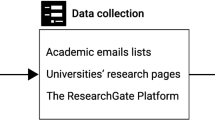Abstract
Mentor professors were surveyed with respect to their most successful “protégés” regarding scholarly production, the mentorship role, and their careers. Career stage, network stratification, and weak-tie theories provided the conceptual frameworks. The 62 mentors were highly productive professors who were predominantly both graduates and employees of research universities. Mentors overwhelmingly nominated as their most successful protégés those whose careers were essentially identical to their own—i.e., their “clones.” Women mentors named as most successfully protégés more than twice as many females and males than men did. More productive mentors linked with a greater number of protégés but were less knowledgable about their personal lives, as Granovetter's theory would predict. The results also demonstrate the openness of the network within stratified levels.
Similar content being viewed by others
References
Blackburn, R. T., and Trowbridge, K. W. Faculty accountability and faculty workload: A preliminary cost analysis of their relationship as revealed by Ph.D. productivity.Research in Higher Education 1973,1 1–12.
Blackburn, R. T., Behymer, C. E., and Hall, E. Research Note: Correlates of faculty publications.Sociology of Education 1978,51 (April), 132–141.
Blackburn, R. T., and Havighurst, R. J. Career patterns of U.S. male academic social scientists.Higher Education 1979,8 553–572.
Cameron, S. M. Women in academia: Faculty sponsorship, informal structures, and career success. Paper presented at annual AERA Meetings, Toronto, Canada, March 1978.
Cares, R. C., and Blackburn, R. T. Faculty self-actualization: Factors affecting career success.Research in Higher Education 1978,9 123–136.
Carnegie Council.A Classification of Institutions of Higher Education. Berkeley, California: Carnegie Council on Policy Studies in Higher Education, 1976.
Cole, J. R., and Cole, S.Social Stratification in Science. Chicago: University of Chicago Press, 1973.
Crane, D. Scientists at major and minor universities: A study of productivity and recognition.American Sociological Review 1965,30 (October), 699–714.
Fulton, O., and Trow, M. Research activity in American higher education.Sociology of Education 1974,47 (Winter), 29–73.
Granovetter, M. The strength of weak ties.American Journal of Sociology 1973,78 1360–1380.
Long, J. S. Productivity and academic position in the scientific career.American Sociological Review 1978,43 (December), 889–908.
Rossi, A. S. Status of women in graduate departments of sociology, 1968–79.American Sociologist 1970,5 (February), 1–12.
Spilerman, S. Careers, labor market structure, and socio-economic achievement.American Journal of Sociology 1977,83(3), 551–593.
Stallings, W. H., and Singhal, S. Some observations on the relationship between research productivity and student evaluations of courses and teaching.American Sociologist 1970,5 141–143.
Author information
Authors and Affiliations
Rights and permissions
About this article
Cite this article
Blackburn, R.T., Chapman, D.W. & Cameron, S.M. “Cloning” in academe: Mentorship and academic careers. Res High Educ 15, 315–327 (1981). https://doi.org/10.1007/BF00973512
Received:
Issue Date:
DOI: https://doi.org/10.1007/BF00973512



